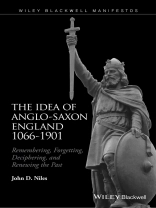- The Idea of Anglo Saxon England, 1066-1901 presents the first systematic review of the ways in which Anglo-Saxon studies have evolved from their beginnings to the twentieth century
- Tells the story of how the idea of Anglo-Saxon England evolved from the Anglo-Saxons themselves to the Victorians, serving as a myth of origins for the English people, their language, and some of their most cherished institutions
- Combines original research with established scholarship to reveal how current conceptions of English identity might be very different if it were not for the discovery – and invention – of the Anglo-Saxon past
- Reveals how documents dating from the Anglo-Saxon era have greatly influenced modern attitudes toward nationhood, race, religious practice, and constitutional liberties
- Includes more than fifty images of manuscripts, early printed books, paintings, sculptures, and major historians of the era
Tabla de materias
List of Vignettes vi
Preface and Acknowledgements vii
Abbreviations xiii
List of Figures xv
1 The Impact of the Norman Conquest 1
2 The Discovery of Anglo]Saxon England in Tudor Times 49
3 British Antiquaries and the Anglo]Saxon Past 77
4 The Founding of a Discipline 1600–1700 109
5 A Period of Consolidation 1700–1800 147
6 The Romantics and the Discovery of Old English Verse 186
7 The Triumph of Philology 220
8 Old English Studies in North America 265
9 Anglo]Saxon England and the Empire 302
Afterword 378
Some Landmark Publications 381
Works Cited 395
Index 415
Sobre el autor
John D. Niles is Professor Emeritus of Humanities at the University of Wisconsin-Madison, Professor Emeritus of English at the University of California, Berkeley, and a Life Member of Clare Hall, Cambridge. A past president of the International Society of Anglo-Saxonists, he is the author or editor of a dozen books on Old English literature and related topics, including Beowulf: The Poem and Its Tradition (1983) and Homo Narrans: The Poetics and Anthropology of Oral Literature (1997).












